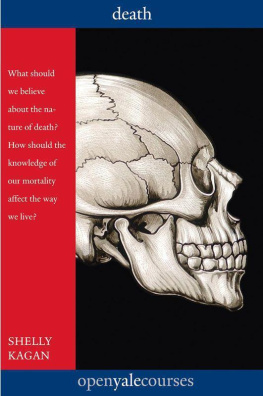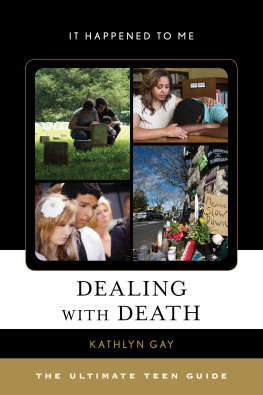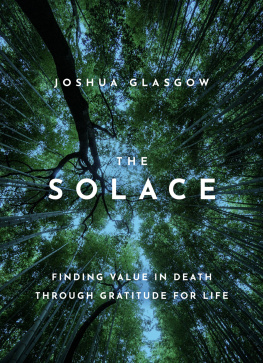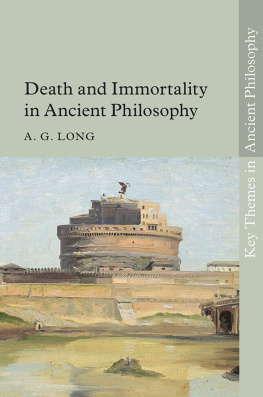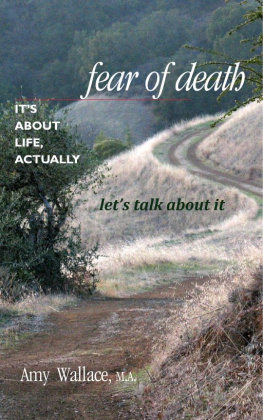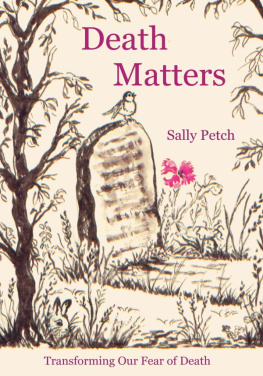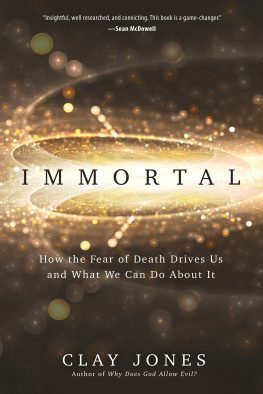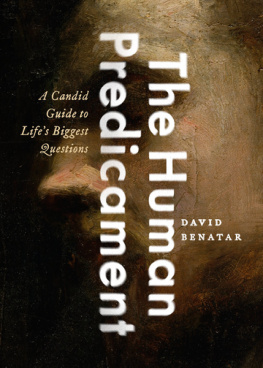Death
THE OPEN YALE COURSES SERIES is designed to bring the depth and breadth of a Yale education to a wide variety of readers. Based on Yales Open Yale Courses program (http://oyc.yale.edu), these books bring outstanding lectures by Yale faculty to the curious reader, whether student or adult. Covering a wide variety of topics across disciplines in the social sciences, physical sciences, and humanities, Open Yale Courses books offer accessible introductions at affordable prices.
The production of Open Yale Courses for the Internet was made possible by a grant from the William and Flora Hewlett Foundation.
RECENT TITLES
Paul H. Fry, Theory of Literature
Shelly Kagan, Death
Dale B. Martin, New Testament History and Literature
FORTHCOMING TITLES
Christine Hayes, Introduction to the Old Testament Ian Shapiro, The Moral Foundations of Politics Steven B. Smith, Introduction to Political Philosophy

Copyright 2012 by Yale University. All rights reserved. This book may not be reproduced, in whole or in part, including illustrations, in any form (beyond that copying permitted by Sections 107 and 108 of the U.S. Copyright Law and except by reviewers for the public press), without written permission from the publishers. Yale University Press books may be purchased in quantity for educational, business, or promotional use. For information, please e-mail sales.press@yale.edu (U.S. office) or sales@yaleup.co.uk (U.K. office). Separation by Friedrich Klopstock, translated by Walter Kaufmann, To the Parcae by Friedrich Holderlin, translated by Walter Kaufmann, from Existentialism , Religion and Death by Walter Kaufmann, copyright 1976 by Walter Kaufmann. Used by permission of Dutton Signet, a division of Penguin Group (USA) Inc. Set in Minion type by Westchester Book Group Printed in the United States of America Library of Congress Cataloging-in-Publication Data Kagan, Shelly. Death / Shelly Kagan. p. cm. (The open Yale courses series) Includes bibliographical references and index. ISBN 978-0-300-18084-8 (pbk. : alk. paper) 1. Death. I. Title. BD444.K26 2012 128'.5dc23
2011045265
A catalogue record for this book is available from the British Library. This paper meets the requirements of ANSI/NISO Z39.48-1992 (Permanence of Paper). 10 9 8 7 6 5 4 3 2 1 This book is dedicated to the memory of my parents Rosh and Abe Kagan
Contents
1. 2. 3. 4. 5. 6. 7. 8. 9. 10. 11. 12. 13. 14. 15. 16.
This book is based on a course on death that I have taught for a number of years at Yale University (and before that, at the University of Illinois at Chicago). In the spring semester of 2007, my lectures for that class were videotaped as part of the Open Yale Courses project. (The lectures can be found online at oyc.yale.edu/philosophy/death.) The written transcripts of those lectures formed the first draft of the book that you have in your hands.
In revising those transcripts for publication, I have eliminated certain repetitions, corrected errors, and altered the presentations of ideas or arguments whenever I felt my original attempts were inadequate. I have eliminated some of the asides (and significantly shortened the discussion of Plato). I have altered the setting and some of the examples. But I have kept the informal tone and language of my original lectures. Death is a serious topicbut we dont have to discuss it or write about it in ponderous academic prose.
I am grateful to my students for their many comments and questions over the years. I am grateful as well to those who have watched the online lectures and emailed me with some of their thoughts and reactions. I am confident that I would never have written this book were it not for the encouraging feedback from people who watched (or listened to, or read) the lectures online and helped me see that the ideas that I discuss here may be of interest to people outside the academy. I am particularly indebted to Yale for inviting me to participate in the Open Yale Courses project. The experience was (and continues to be) an extraordinary one.
In my lectures and this book I constantly draw on ideas that have been developed and debated by a large number of contemporary philosophers. I have only marked a few of these philosophical debts with explicit citations (in keeping with the books introductory nature); but little that I say here is particularly original to me.
CHAPTER 1
This is a book about death. But it is a work of philosophy, and what that means is that the topics that were going to discuss are not identical to the topics that other books on death might try to cover. So the first thing I want to do is to say something about some of the subjects that we wont be discussing, things that you might reasonably expect or hope that a book on death would talk about, so that if this is not the book you were looking for, youll realize that right away.
What I primarily have in mind are psychological and sociological questions about the nature of death, or the phenomenon of death. For example, a book on death might well have a detailed discussion of the process of dying or coming to reconcile yourself with the fact that youre going to die. Were not going to talk about that. Similarly, were not going to talk at all about the process of grieving or bereavement. And were not going to discuss the funeral industry in America, or the troubling attitudes that we take toward the dying, or how we tend to try to keep the dying hidden from the rest of us. These are all perfectly important topics, but theyre not, as I say, topics that were going to be talking about in this book.
So what will we talk about? We will be discussing philosophical questions that arise as we begin to think about the nature of death. Questions like, what happens when we die? Actually, though, to get at that question, the first thing were going to have to do is think about this question: what are we? What kind of an entity is a person? In particular, do we have souls ?
I might as well explainright here at the startthat in this book I am going to be using the term soul as a bit of philosophical jargon. By soul Im going to mean something immaterial, something distinct from our bodies. So one thing that we will be asking is, do we have immaterial souls, something that might survive the death of the body? And if not, what does that imply about the nature of death? What happens when we die?
Heres another question well be asking: what would it take for me to survive my death? Indeed, we need to ask more generally, what is it for me to survive at all? For example, what does it mean for me to survive, say, tonight ? Here, roughly, is what I mean by that question. At some point tomorrow afternoon somebody is going to be sitting here at my computer, working on this book. I certainly presume (and hope!) that it will be me. But what exactly is it for that person, who will be sitting here typing tomorrow, to be the very same person as the person who is sitting here typing today? Thats a question about the nature of personal identity across time. Pretty clearly, if we are going to think properly about death and survival, and the possibility of my continued existence after my death, we first have to get clear about the very nature of personal identity.
These sorts of questionsquestions about the existence of souls and the nature of death and the possibility of surviving deathwill occupy us for roughly the first half of the book. And then well turn to value questions. If death is really the end, can death be bad ? Of course, most of us are immediately and strongly inclined to think that death is bad. But there are philosophical puzzles about how death could be bad.
Let me try to give you a quick feel for one of these puzzles. Suppose that after my death I wont exist. If you stop to think about it, then, it becomes hard to see how death can be bad for me. After all, it seems that death cant be bad for me when I am dead: how can anything be bad for something that doesnt even exist? But if death cant be bad for me when I am dead, how can it be bad for me at all? After all, it certainly doesnt seem that it can be bad for me now , while Im still alive!
Next page
